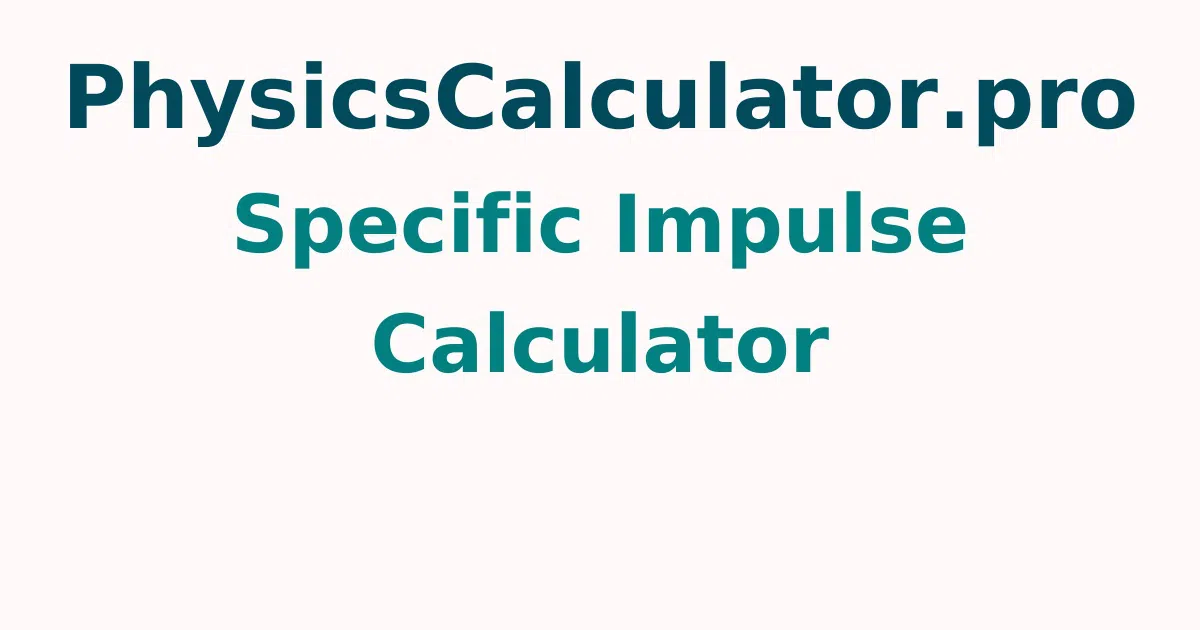Specific Impulse Calculator
This precise impulse calculator can assist you in estimating a jet or rocket engine's performance. The specific impulse is frequently used to determine how successfully an engine produces thrust. Because it is simply a function of thrust generated and mass flow rate or exhaust velocity, this metric is critical for evaluating the efficiency of engines of different classes.
An engine with a higher specific impulse creates more thrust per mass of fuel or propellant, making it more efficient. It also varies depending on the function and kind of engine; for example, a rocket engine's particular impulse is substantially lower than that of a jet engine. The specific impulse equation aids in the initial analysis by estimating a preliminary engine size and the amount of fuel mass flow rate required. So, what exactly is a distinct impulse? Continue reading to learn about the unique impulse formula and how to use it.
What is a Specific Impulse?
The specific impulse of an engine is the amount of time it takes for it to generate thrust equal to its mass at 1g. To put it another way, it's the amount of thrust generated by the engine per unit quantity of propellant. The thrust is directly proportional to the particular impulse, but the mass flow rate is inversely proportional. It specifies the propellant flow rate necessary to achieve thrust equal to mass for the specified time period or vice versa. Consider an engine that produces thrust FF over time dt; the total impulse is calculated as follows: I=∫Fdt
Specific impulses are measured in time units, such as seconds. As a result, this metric provides a handy tool to evaluate performance between different engines. The particular impulse indicates the efficiency with which propellant is used. A rocket with a higher specific impulse will climb to a higher altitude more quickly.
Specific Impulse Formula
The particular impulse equation for a thrust engine FF, with a mass flow rate m, is:
Isp = F / (mdot x g)
If you don't know how much thrust an engine with a dry weight of WW produces, you can utilize the thrust-to-weight ratio Tr, to put a value on it, which is:
Tr = F/W
Isp = W Tr/ (mdot x g)
On the other hand, The thrust FF is related to the exhaust velocity ve is as follows:
F = mdot x ve
Isp = ve x g
TSFC stands for thrust-specific fuel consumption. An engine's efficiency in terms of fuel consumption. In other words, the amount of fuel consumed per unit of time to create a unit of thrust. The term thrust-specific denotes that this parameter can be referred to as fuel consumption per unit thrust. (g/s. kn)or (Ib/h.Ibf) in imperial units. In terms of math, this is:
TSFC = F/ mdot
Specific thrust is the inverse of the TSFC parameter, i.e. the thrust produced per unit of fuel flow rate.
Fs = F/mdot
Find similar concepts related to physics all under one roof at Physicscalculatorpro.com and resolve all your doubts as a part of your homework or assignment.
How to find out Specific Impulse?
To get an engine's particular impulse, use the following formula:
- Step 1: Find out how much thrust the engine produces.
- Step 2: Calculate the thrust by multiplying it by the mass flow rate.
- Step 3: To get the particular impulse, divide the resultant by gravitational acceleration.
Alternatively: To calculate the particular impulse, divide the exhaust velocity by the gravitational acceleration.
FAQs on Specific Impulse Calculator
1. What is a specific impulse?
The specific impulse of an engine is the number of seconds it takes to produce one pound of thrust using a pound of propellant or fuel. To put it another way, the particular impulse is a measurement of how long an engine can create thrust continuously by entirely burning a unit mass of fuel. Continuous thrust implies that the body coupled to the engine accelerates.
2. Is it beneficial to have a high specific impulse?
Because it produces more push for the same amount of fuel, the engine with the higher specific impulse value is more efficient.
3. What's the best way to increase a specific impulse?
To optimize overall impulse, it's necessary to balance the burn's duration with the force generated by the burn. A motor intended to generate the needed amount of thrust over a long burn time would likely produce a lower total impulse than one designed to provide the required amount of push over a shorter burn time.
4. What effect does a specific impulse have on a rocket?
The particular impulse of a rocket propellant is an estimate of how quickly the propellant is discharged from the rocket's tail end. A rocket with a high particular impulse requires less fuel than one with a low specific impulse. The higher the particular impulse, the more force is applied to the gasoline rushing out.
5. What is the definition of thrust-specific fuel consumption?
It is the amount of fuel consumed per second to produce a unit of thrust output. This characteristic is also known as the engine's fuel efficiency.
